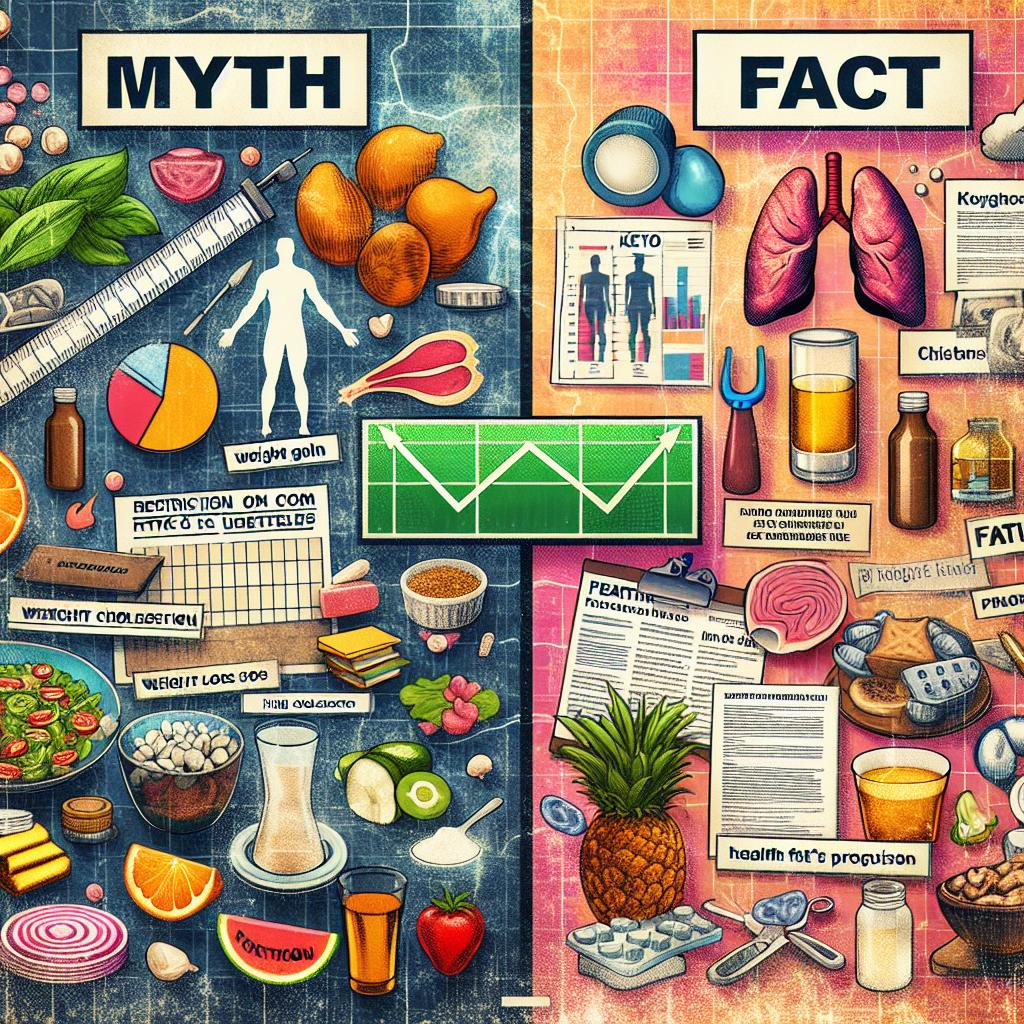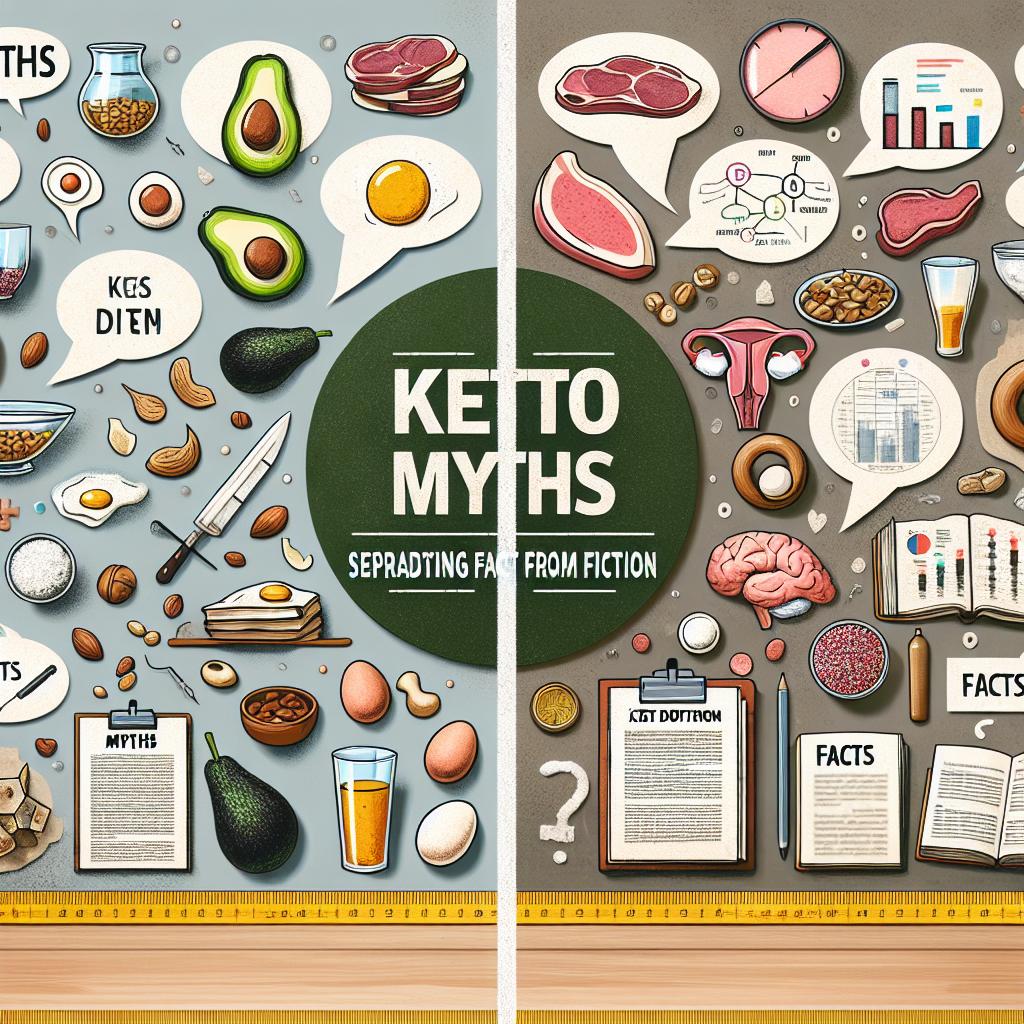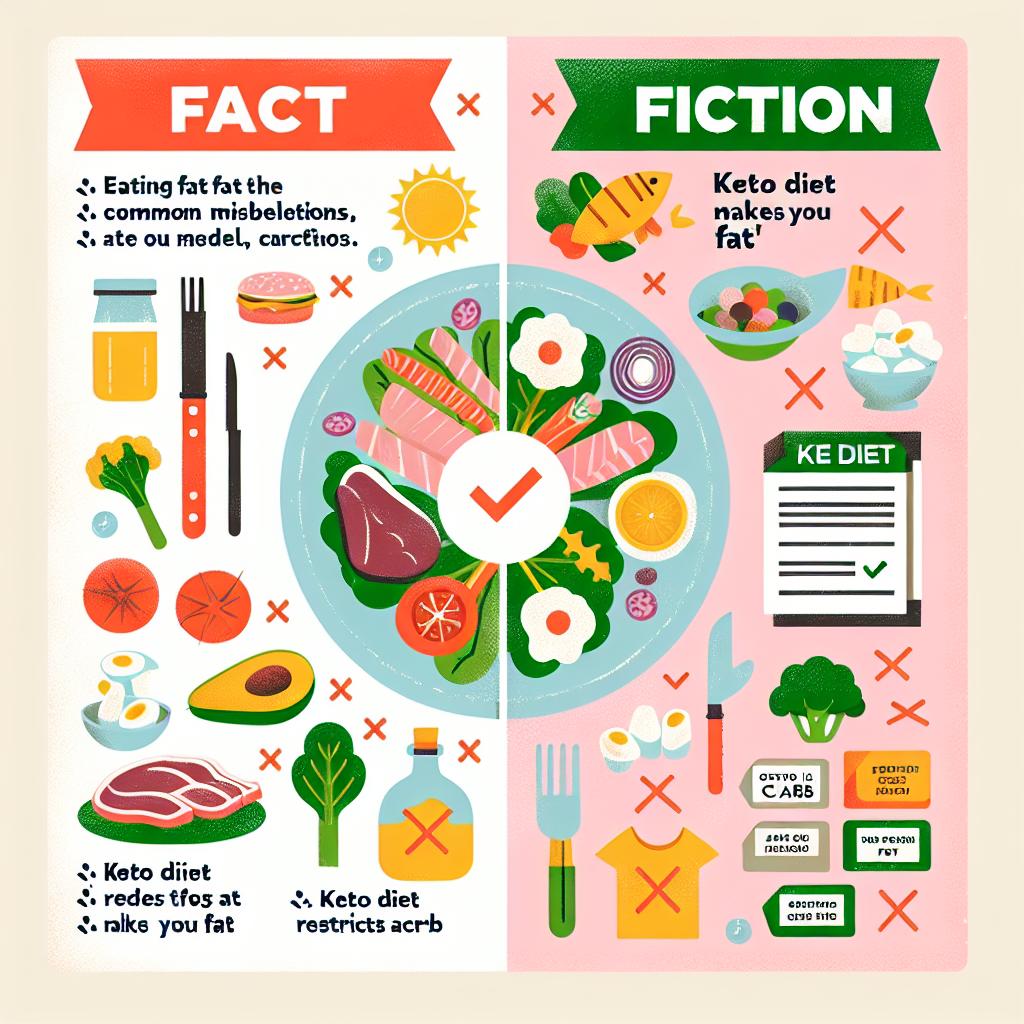This post may contain affiliate links which means I may receive a commission for purchases made through links. Learn more on my Private Policy page.
Introduction
Embarking on a new diet can often feel like navigating through a jungle of information, misconceptions, and well-intentioned advice. The Keto diet, with its promise of quick weight loss and enhanced energy, has garnered a dedicated following in recent years. However, like any popular trend, it’s not without its fair share of myths and misunderstandings. Are you really cutting carbs, or could you be indulging in hidden sugars? Is butter your new best friend, or are you paving the way for health issues?
Join us on a friendly journey as we peel back the layers of the Keto diet, aiming to separate fact from fiction. From the science behind ketosis to debunking common myths that have taken root in popular culture, we’ll arm you with the knowledge to make informed choices on your health journey. So grab a cup of coconut milk coffee, get comfy, and let’s dive into the deliciously intriguing world of Keto!
Understanding the Keto Basics: What You Need to Know
The ketogenic diet, often referred to simply as keto, is largely misunderstood due to pervasive myths that cloud its reputation. At its core, the keto diet is about significantly reducing carbohydrate intake and replacing it with fat, which puts the body into a metabolic state known as ketosis. Here’s what you should keep in mind:
- Keto Isn’t Just About Bacon: While high-fat foods are a cornerstone of the diet, it’s essential to focus on healthy fats like avocados, nuts, and olive oil.
- Not All Carbs Are Created Equal: Emphasizing whole foods over processed carbs is crucial for reaping the benefits.
- Hydration is Key: Drinking plenty of water helps mitigate common side effects during the initial transition to keto.
Additionally, understanding the potential long-term effects and nutritional needs is vital. While the keto diet can be effective for weight loss, it’s equally important to ensure that your approach is balanced and sustainable. Consider how your meals are composed:
| Food Group | Percentage of Daily Intake |
|---|---|
| Fat | 70-75% |
| Protein | 20-25% |
| Carbohydrates | 5-10% |
By understanding these basics, you can better navigate the keto landscape and separate fact from fiction, ensuring that you embark on this dietary journey with the right mindset and knowledge.

Debunking Common Misconceptions: The Truth About Carbs and Fats
When it comes to nutrition, carbohydrates and fats often find themselves at the center of heated debates. One common misconception is that all carbs are detrimental to your health. In reality, carbohydrates are essential for energy, especially for those leading an active lifestyle. Whole grains, fruits, and vegetables should be embraced as they provide vital nutrients and fiber that are necessary for optimal health. Avoiding all carbs can lead to nutrient deficiencies and energy dips, countering the benefits of low-carb diets. On the flip side, not all fats are created equal—healthy fats, such as those found in avocados, nuts, and olive oil, can support heart health and enhance metabolic function.
Another frequent myth involves the idea that a low-carb, high-fat diet is the only sensible approach to weight loss. While ketogenic diets can be effective for some, they aren’t a one-size-fits-all solution. Many people can achieve their health goals by focusing on a balanced intake of carbs and fats, tailoring their food choices to their lifestyle and personal preferences. The following table outlines some common types of carbs and fats, emphasizing their benefits:
| Type | Examples | Benefits |
|---|---|---|
| Carbohydrates | Brown rice, oats, fruits | Energy source, fiber, essential nutrients |
| Healthy Fats | Avocado, nuts, olive oil | Heart health, hormone regulation, brain function |

Healthy Keto: Smart Choices for Sustainable Living
The ketogenic diet is often surrounded by a whirlwind of misconceptions that can deter individuals from exploring its health benefits. One common myth is that you must consume copious amounts of fat to stay in ketosis. While fat is a primary fuel source in this diet, quality and sources matter. Opting for healthy fats can lead to better outcomes. Emphasize foods such as:
- Avocados
- Olive oil
- Nuts and seeds
Another myth is that the keto diet is high in protein. In reality, it’s a moderate-protein diet designed to maintain muscle while encouraging fat loss. Focusing on lean sources of protein can support overall health. Consider incorporating options like:
- Eggs
- Fish
- Poultry
For a clearer understanding, take a look at the following table highlighting the ideal macronutrient ratios for a healthy keto diet:
| Macronutrient | Recommended Percentage |
|---|---|
| Fat | 70-75% |
| Protein | 20-25% |
| Carbohydrates | 5-10% |

Beyond Weight Loss: The Hidden Benefits of a Keto Lifestyle
The ketogenic lifestyle isn’t solely about shedding pounds; it offers a variety of hidden benefits that can enhance your overall well-being. Many individuals who adopt this dietary approach discover improvements in their mental clarity and focus. The brain thrives on ketones, which are produced during ketosis, providing a steady energy source that can help you think sharper and remain productive throughout the day. Additionally, many on a keto diet report feeling a sense of emotional stability and balance, likely due to regulated blood sugar levels that prevent the highs and lows associated with traditional diets.
Moreover, embracing a ketogenic lifestyle can positively influence your heart health. By emphasizing healthy fats and reducing refined carbohydrates, many practitioners experience improved cholesterol levels and reduced triglycerides. It’s also worth noting that many keto-friendly foods, like avocados, nuts, and olive oil, are rich in essential nutrients and antioxidants. This creates a virtuous cycle of health benefits that can reduce the risk of chronic diseases. Here’s a table summarizing the potential health benefits you might experience:
| Benefits | Description |
|---|---|
| Mental Clarity | Improved focus due to steady ketone energy. |
| Emotional Stability | Balanced blood sugar levels contribute to mood stability. |
| Heart Health | Better cholesterol and triglyceride levels. |
| Rich in Nutrients | Incorporation of nutrient-dense foods like avocados and nuts. |
Q&A
Q&A: Keto Diet Myths - Separating Fact from Fiction
Q: What is the Keto Diet, and why is it so popular?
A: The Keto Diet, short for Ketogenic Diet, is a low-carb, high-fat eating plan designed to shift your body into a state of ketosis, where it burns fat for fuel instead of carbohydrates. Its popularity has soared because many people have reported impressive weight loss results and improvements in mental clarity. Plus, who doesn’t like the idea of munching on bacon and cheese while losing weight?
Q: Is it true that you can eat as much fat as you want on the Keto Diet?
A: Not exactly! While the Keto Diet emphasizes high fat intake, it’s important to remember that quality and portion control still matter. It’s all about the balance! Think of it as a fabulous cheese platter—sure, indulge, but don’t overdo the brie on your crackers! Focus on healthy fats like avocados, nuts, and olive oil. Your waistline will thank you!
Q: Will I never be able to eat carbs again?
A: Fear not, dear carb-lovers! The Keto Diet isn’t a life sentence; it’s more like an extended stay at a charming fat-filled resort. While you may need to limit your carb intake to get started, many find that they can gradually reintroduce small amounts of healthy carbs over time once they’ve achieved their goals. Life’s too short to never enjoy a slice of cake again, right?
Q: Can I exercise while on the Keto Diet?
A: Absolutely, yes! However, some people might experience a period of adjustment, sometimes called the “Keto flu,” which can leave you feeling a bit sluggish. But fear not, as your body adapts to burning fat for fuel, many report enhanced endurance and energy during workouts. Plus, exercising can actually help you glide through the fog of adaptation—like a smooth ride after a bumpy start!
Q: Does the Keto Diet lead to nutritional deficiencies?
A: It can, but it doesn’t have to! Many people worry they’ll miss out on essential nutrients since fruits and certain vegetables are lower on the carb list, but with a little planning, you can fill your plate with a colorful array of low-carb veggies and nutrient-dense foods. Think leafy greens, berries in moderation, and delicious fats—your body deserves that rainbow!
Q: Are all Keto-friendly products healthy?
A: Not so fast! Just because something is labeled “Keto” doesn’t mean it’s a health food. Many packaged products can be loaded with artificial ingredients, unhealthy fats, or sugar substitutes that may not be beneficial. Always flip the package over and check the ingredients. Remember, real food is usually the star of the show on this diet!
Q: What’s the biggest myth about the Keto Diet?
A: One of the biggest myths is that Keto is a one-size-fits-all solution. Every body is different! What works wonders for one person may not for another. It’s essential to listen to your body and consult a healthcare professional to tailor your approach. Embrace the journey—self-discovery is half the fun!
Q: Can you “cheat” on the Keto Diet?
A: Yes, you can! But remember, the occasional cheat should be an enjoyable treat, not a regular affair at the buffet line. Think of it as a dance—you can break out into a little jig once in a while without completely losing the rhythm. Just be mindful that more significant cheats could knock you out of ketosis, and nobody wants to take a backward step on this delicious journey!
Q: What’s the most important takeaway about the Keto Diet?
A: Embrace the process, keep an open mind, and remember it’s all about balance. The Keto Diet can be a wonderful tool for some, but at the end of the day, what matters most is finding an eating style that makes you feel vibrant and happy. Savor the journey, enjoy your meals, and find what works best for you! Cheers to health and happiness! 🥑🎉
Key Takeaways
As we wrap up our journey through the intriguing landscape of keto diet myths, we hope you feel equipped with a clearer understanding of what’s fact and what’s fiction. Navigating the nutrition world can sometimes feel like wandering through a maze, with tempting traps and misleading signs at every turn. But now, with your newfound knowledge, you can confidently stride forward, making informed choices that align with your health goals.
Remember, the keto diet isn’t a magic potion; it’s a simple and effective approach tailored to individual needs. Embrace the power of whole foods, listen to your body, and don’t be afraid to seek out a healthcare professional to guide you on your unique path.
So, here’s to debunking myths and celebrating the delicious possibilities of keto! Whether you’re new to this way of eating or a seasoned pro, we encourage you to enjoy the journey, savor the flavors, and keep an open mind as you explore the ever-evolving world of nutrition. Happy keto-ing! 🍳🥑✨

